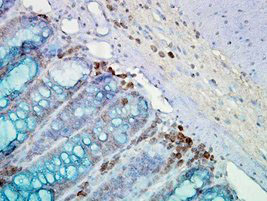HSP90AB1 Mouse Monoclonal Antibody [Clone ID: AC-16]
CNY 6,017.00
| Cited in 1 publication. |
CNY 3,080.00
CNY 300.00
CNY 1,430.00
CNY 2,900.00
CNY 9,998.00
Specifications
| Product Data | |
| Clone Name | AC-16 |
| Applications | IHC |
| Recommend Dilution | 1ug/ml was sufficient for detection of hsp90 by Western Blot in 20ug of HeLa lysate. |
| Reactivity | Human, Rabbit, Rat, Mouse, Chicken, Achyla, Wheat Germ, Sf9 cell line |
| Host | Mouse |
| Clonality | Monoclonal |
| Immunogen | Heat shock protein 900 from the water mold Achyla ambisexualis |
| Formulation | PBS pH7.4, 50% glycerol, 0.09% sodium azide |
| Concentration | lot specific |
| Purification | Protein G Purified |
| Conjugation | Unconjugated |
| Storage Condition | Store at -20°C as received. |
| Gene Name | heat shock protein 90kDa alpha family class B member 1 |
| Database Link | |
| Background | Hsp90 is a highly conserved and essential stress protein that is expressed in all eukaryotic cells. From a functional perspective, hsp90 participates in the folding, assembly, maturation, and stabilization of specific proteins as an integral component of a chaperone complex . Despite its label of being a heat-shock protein, hsp90 is one of the most highly expressed proteins in unstressed cells (12% of cytosolic protein). It carries out a number of housekeeping functions including controlling the activity, turnover, and trafficking of a variety of proteins. Most of the hsp90-regulated proteins that have been discovered to date are involved in cell signaling . The number of proteins now know to interact with Hsp90 is about 100. Target proteins include the kinases v-Src, Wee1, and c-Raf, transcriptional regulators such as p53 and steroid receptors, and the polymerases of the hepatitis B virus and telomerase.5 When bound to ATP, Hsp90 interacts with co-chaperones Cdc37, p23, and an assortment of immunophilin-like proteins, forming a complex that stabilizes and protects target proteins from proteasomal degradation. In most cases, hsp90-interacting proteins have been shown to co-precipitate with hsp90 when carrying out immunoadsorption studies, and to exist in cytosolic heterocomplexes with it. In a number of cases, variations in hsp90 expression or hsp90 mutation has been shown to degrade signaling function via the protein or to impair a specific function of the protein (such as steroid binding, kinase activity) in vivo. Ansamycin antibiotics, such as geldanamycin and radicicol, inhibit hsp90 function . |
| Synonyms | D6S182; HSP84; HSP90B; HSPC2; HSPCB |
| Note | This antibody is reactive with both the constitutive and the inducible form of Hsp90. It does not bind to the native form and does not recognize Hsp90 from E.coli or yeast. |
| Reference Data | |
| Protein Families | Druggable Genome, Stem cell - Pluripotency |
| Protein Pathways | Antigen processing and presentation, NOD-like receptor signaling pathway, Pathways in cancer, Progesterone-mediated oocyte maturation, Prostate cancer |
Citations (1)
| The use of this Antibodies has been cited in the following citations: |
|---|
|
Diagnosis and surgical treatment of retroperitoneal paraganglioma: A single-institution experience of 34 cases
,null,
Oncology Letters
,PubMed ID 28789448
[HSP90AB1]
|
Documents
| Product Manuals |
| FAQs |
| SDS |
Resources
| 抗体相关资料 |
其它HSP90AB1产品


 United States
United States
 Germany
Germany
 Japan
Japan
 United Kingdom
United Kingdom
 China
China

